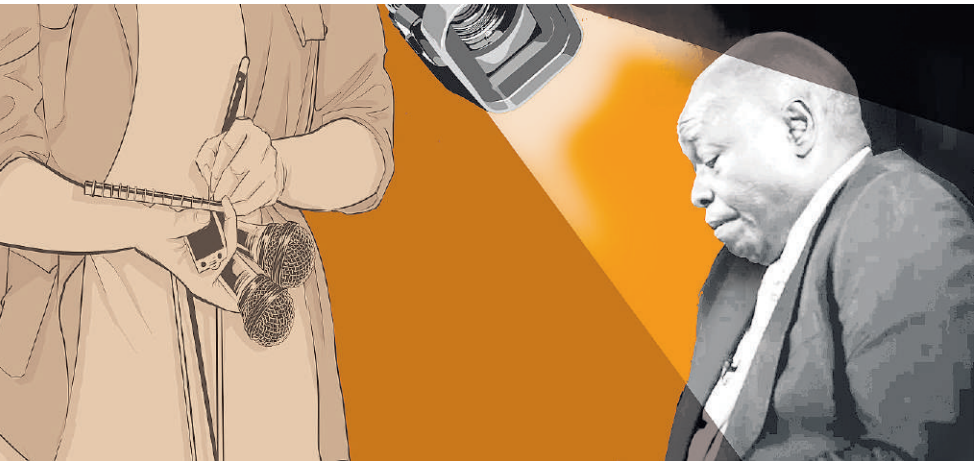
 STAR ILLUSTRATION
STAR ILLUSTRATION
If President William Ruto is, as former Attorney General Justin Muturi now claims, unfit for office, then his former deputy-turned-bitter-rival, Rigathi Gachagua,with his heedless swagger, work-shy tendencies and a mafia don’s appetite for vengeance, is the poster child of unfitness. All the perfumes in Arabia would struggle to mask the stench that Gachagua left behind after his brief stint as the second in command.
He spent the better part of his time in power pursuing a nakedly tribal agenda with all the subtlety of a blaring ambulance siren and issuing erratic, divisive and patently selfish statements on a daily basis in a manner more befitting of an unhinged radio shock jock than a national leader. These, dear reader, were not slips of the tongue but windows into a very shallow worldview that sees public office as a treasure to be shamelessly plundered and not a sacred trust to be honoured.
However, instead of exercising sound
editorial judgment and leading a sober reassessment of his time in office, a
section of Kenya’s media that's seemingly captivated by the spectacle of
Gachagua’s headline-chasing theatrics, has begun rebranding him.
The same media outlets that, just months ago, rightly condemned the former DP’s divisive rhetoric and backward ideas are now recasting him as a self-styled “truthful man.” To uncritically echo a politician’s attempts at rebranding without reminding the public of his long record of lies and half-truths isn’t just irresponsible journalism but historical revisionism disguised as reporting.
We’ve all seen this movie before. Not long ago, Ruto was a smooth-talking, populist outsider, billed by many journalists as a hustler with fresh ideas and the courage to upend the political establishment. Many in the media bought the script wholesale. I witnessed this editorial misjudgment firsthand in the run-up to the last election, while working inside one of Kenya’s most influential newsrooms.
That illusion held even as Ruto was dogged by corruption allegations, a case at The Hague that was marred by witness tampering and a very clear history of undermining institutions in the quest for self-enrichment. Now that Ruto sits atop the very dynastic establishment he once decried, having accumulated more Executive power than many thought possible under the 2010 Constitution, most Kenyans are finally seeing his true face and it’s not the one the media’s myth-making machine promised in the build-up to the last election.
The history of postcolonial Africa is
littered with leaders who mastered the optics of populism. They know how to
speak of “the people” while amassing power and hollowing out institutions. The
press that lionises them today will find itself at their mercy tomorrow. Gachagua
has revealed enough of himself for us to recognise that he fits this mould all
too well.
To speak candidly, what we are witnessing is a deeper failure of imagination at work in our newsrooms. Kenya’s political story is constantly told in binaries, Raila vs Ruto, Ruto vs Gachagua, old guard vs new blood etc. This leaves little room for actual structural critique or for the emergence of leaders not forged in the fire of ethno-nationalist demagoguery.
There is therefore nothing organic or unstoppable about Gachagua’s ascent. Just like any other politician, it is the product of deliberate choices by the reporters who interview him, the editors who amplify him by giving him uncritical coverage and the citizens whose attention is monetised and manipulated in the process.
What’s more troubling is that the media’s softening portrayal of the former DP comes at a moment of great national peril and institutional rot. State House has become a revolving door for contractors, with “renovations” and “upgrades” now emerging as euphemisms for looting. The taxpayer foots the bill while an untold number of children can't go to school and a generation of youths struggle to find dignified work.
Gachagua should not be granted a rhetorical escape hatch by the media, because far from being a principled critic of UDA’s excess, his true record shows he was—and remains—a willing co-conspirator.
This isn’t, in any fashion, a call to vilify Gachagua, but a plea to our colleagues in the media that the line between honest analysis and mythmaking must be clearly and conscientiously drawn. We have seen the consequences of what happens when it isn't.



![[PHOTOS] KPC signs a service legal agreement with KEBS](/_next/image?url=https%3A%2F%2Fcdn.radioafrica.digital%2Fimage%2F2025%2F07%2Fa63c369d-7d4d-4a8c-bef9-34dba4c6d536.jpg&w=3840&q=100)









